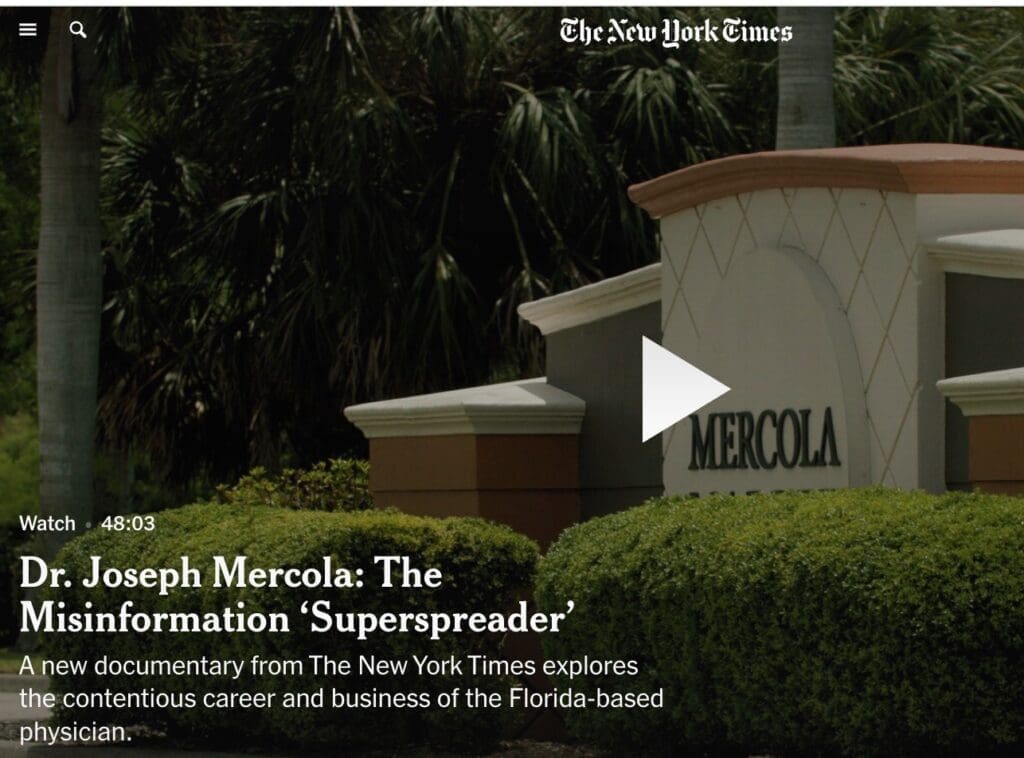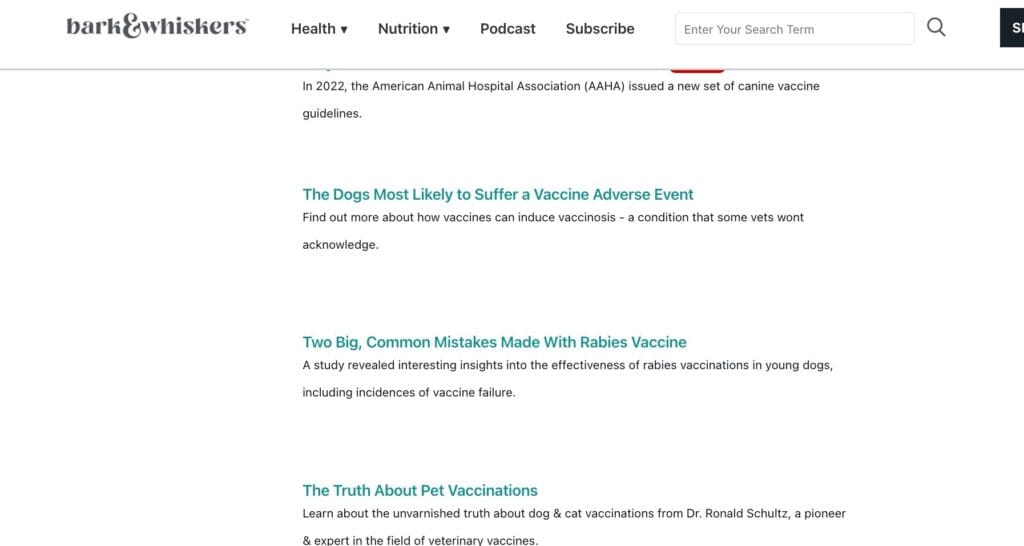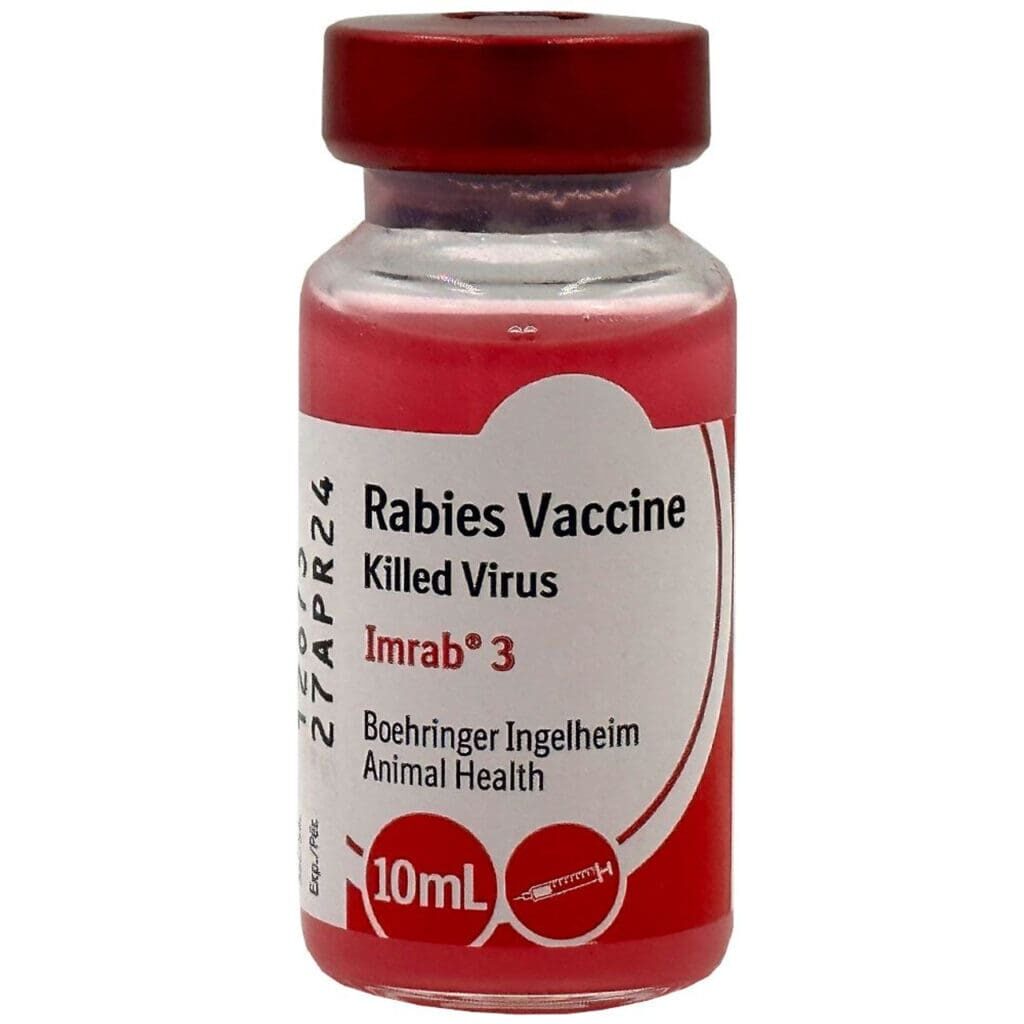Misinformation Spreader Mercola Owns Veterinarian’s Popular Blog.
Most readers have no idea.
Bestselling “Forever Dog” author and veterinarian Karen Shaw Becker describes herself as the “most followed veterinarian in the world” on her website. But dog owners who read Dr. Becker’s blog may never know that the pet-focused website, “Bark & Whiskers”, is listed by Mercola as one of “six different product brands” of “Mercola Market” — and that Mercola’s founder is Joseph Mercola, dubbed the “most influential spreader of coronavirus misinformation online” by The New York Times in 2021.
The site, which promotes vaccine skepticism and other “alternative” or “wellness” approaches to medicine, was formerly called Mercola Healthy Pets, but has been rebranded, leaving out Mercola’s name. Yet it still redirects readers frequently to the online “Mercola Market” as well as the MercolaHealthyPets YouTube channel–and, it shares a CEO with Mercola.com, according to Dr. Becker. Mercola Healthy Pets launched in 2010, according to its website, over a decade after the founding of the human-focused wellness now-empire. Like its sister brands, Mercola Healthy Pets mixes discussions of real and often newsworthy health matters, including adverse reactions to vaccines, with what several veterinarians consulted for this article say are unsubstantiated claims about vaccine efficacy and the supposed harms caused by vaccinations.


“I’m not paid any royalties nor do I make a % of sales,” Dr. Becker told The Canine Review when asked about the financial relationship between her blog and Mercola. She added: “I’m paid to formulate and create unique, human grade pet products, and like you, paid to write articles.” Dr. Becker declined to specify the amount in dollars but did say she does not earn any commission for sales resulting in clicks originating from her blog.

Dr. Joseph Mercola, who said in a 2017 affidavit obtained by The Washington Post that his net worth from his wellness empire exceeds $100 million, declined to comment for this story. Multiple attempts to reach Mercola for comment via email over several weeks were unsuccessful. TCR also attempted to contact Mercola through Becker who said he was also not returning her emails.
Millions of readers
According to Becker, the “Bark & Whiskers” blog sees over 200,000 monthly visitors. The blog reaches another 2.3 million pet parents who follow Becker on Facebook. Becker, a holistic veterinarian, is the bestselling author of “The Forever Dog,” and describes herself as Mercola’s veterinary consultant. Becker told TCR that Mercola has never been involved with “any aspect” of Bark & Whiskers, other than giving then-CEO Steve Rye his approval to seek out a veterinarian consultant in 2009. But, she said, she and Mercola share similar approaches when it comes to health guidance.
“Dr. Mercola is also passionate about what he puts in his body, in terms of quality of products, he’s a stickler for potency and purity,” Becker said. “He’s also very focused on health freedoms, everyone having access to health resources and make their own choices.”
Becker regularly authors blog articles and posts videos promoting controversial raw food diets, pushing for limited vaccine schedules, and claiming that some pets have lifelong immunity to life-threatening illnesses without having had the booster shots recommended by the vast majority of veterinarians. She has also said in a podcast with Mercola that veterinarians are “indoctorined” (instead of “indoctrinated”) by veterinary school.
Vaccine Hesitancy Rising
The number of people in the U.S. who oppose vaccines in humans has risen since 2018, according to the Vaccine Confidence Project (a global research group that monitors public confidence in vaccines), and there is evidence that the same sentiment is spreading among pet owners, according to a study published last year in the journal Vaccine. The study found that 53 percent of 2,200 dog owners surveyed expressed doubt about the safety, efficacy and/or importance of canine vaccinations. The study authors noted that people with negative attitudes about human vaccines may have the same beliefs about their pets’ inoculations.
Dr. Gabriella Motta, a Pennsylvania-based vet and a co-author of the study in Vaccine, said that some of the guidance that Becker offers on the Bark & Whispers site is inaccurate. “I would characterize it as misinformation,” she asserted in an interview with TCR.
Vet academic: “red flags” in Becker’s vaccine recommendations
She added in an email that a review of Becker’s vaccine schedule recommendations, for example, raised “a couple of red flags,” including waiting until 9 to 10 weeks of age for puppies to receive their first round of the distemper/adenovirus/parvovirus vaccination and waiting until a pet is six months old to vaccinate against rabies.
“Waiting until six months of age to vaccinate opens up a large window of time where a pet could be totally unprotected against developing a fatal zoonotic disease,” Motta said, adding that she has seen a number of unvaccinated puppies develop parvovirus in her practice. “If following the above vaccine plan, dogs would be left unprotected from a common and fatal disease for weeks during a very crucial period of their life and early development.”
Mercola Healthy Pets’ 2023 rebranding as Bark & Whiskers came less than six months after a documentary by The New York Times examined Mercola’s pandemic-era misleading claims.
Dr. Becker explained the rebranding this way:
“I have been strongly suggesting my client to rebrand their pet line since 2012, as Dr. Mercola isn’t a veterinarian and people in the pet space have no idea who he is,” Becker told TCR in an email.
Because the raw ingredients in some of the human-grade pet products she formulated for the company has achieved USDA organic status over the years, the decision was made to rebrand during the reprinting of labels, she said, referring to the U.S. Department of Agriculture.
In her articles on vaccinations, Becker warns her readers about adverse vaccine reactions in dogs even though such reactions, studies have found, are statistically rare. In place of some boosters, Becker recommends antibody testing and the use of a homeopathic vaccine “detox” like thuja, a medicinal plant, or Chlorella, a species of microalgae, if an inoculation is given.
None of the experts interviewed for this article were aware of “detox” treatments, and Motta described the treatment as something she “wouldn’t think would be necessary.”
But Becker told TCR in a phone interview, “Each additional dose of vaccine over and over can potentially increase the risk for adverse reaction.
“By serially, repeatedly, and potentially unnecessarily vaccinating animals that are already immunologically protected against those diseases, there isn’t an immune benefit,” she said. “It’s not like a gas tank where their immunity runs out.”
CDC Pushes Back on Becker’s Vaccine Schedule Recommendations
According to Dr. Ryan Wallace, however, a Centers for Disease Control and Prevention veterinary epidemiologist who leads the agency’s rabies team, immunity does in fact decrease over time, and antibody testing only captures a pet’s immunity against a disease at a given point in time.
Rabies, along with distemper, adenovirus and parvovirus, are considered core vaccines and are essential for dogs, according to the American Animal Hospital Association (AAHA), an organization that accredits veterinary practices. Other immunizations like Bordetella vaccine (also called kennel cough vaccine), canine influenza vaccine, and leptospira vaccine for leptospirosis, are considered non-core vaccines, but they may be just as necessary for some pets, based on their risk and lifestyle, per the AAHA.
“Many veterinarians recommend Bordetella vaccines. I don’t,” Becker said in one YouTube video.
“Please understand that the only reason that these institutions demand that your pet be vaccinated is to remove liability from themselves,” she said, adding, “The Bordetella vaccines, for the most part, are completely useless.”
But Dr. Ashley Nichols, a Maryland-based veterinarian and president of the Maryland Veterinary Medical Association, told TCR that Bordetella vaccines are crucial for dogs that come into close contact with other dogs, for example at kennels or grooming salons. Not unlike the COVID-19 vaccines in humans, Bordetella vaccines won’t prevent all infections, but they prevent a majority of hospitalizations from kennel cough, a highly-infectious respiratory illness, Nichols says.
Asked about her Bordetella vaccine advice, Becker clarified in a phone call that she believes modified live vaccines like the parvovirus vaccine are very effective, but that the same doesn’t hold true for vaccines intended to prevent bacterial diseases.
Asked about the vaccine guidance provided on the Mercola Healthy Pets website, which she looked at before it was rebranded as Bark & Whiskers, Nichols said, “I’m concerned.”
“It’s a misunderstanding of the science,” she said, and, she added, “a little bit of fear mongering.”
YouTube videos from the early days of Mercola Healthy Pets took the same approach as the Mercola parent site, with Becker speaking on a range of topics from legitimate concerns over pets ingesting poison and canine obesity to criticism of rabies dosing in small animals. (Becker argued that smaller dogs shouldn’t be given the same dose of rabies vaccine as larger breeds.)
Veterinarians say a full dose of the rabies vaccine is required for the vaccine to work and, just like humans, doses are not dependent on size.
“All the factors in the vaccine need to be there in everyone to work,” Motta said.
Bark & Whiskers and Mercola also question the use of preservatives like thimerosal (a mercury-containing compound) in some vaccines for pets. The use of thimerosal as a preservative in vaccines has been phased out in the last decades, according to the U.S. Food and Drug Administration. But preservatives, which help prevent potentially life-threatening bacterial growth, have been repeatedly proved to be safe in inoculations, both in the U.S. and abroad, the F.D.A. has said.
AVMA President Pushes Back on Becker’s Claims About Vaccine Safety
“All veterinary vaccines are evaluated by the U.S.D.A’s Center for Veterinary Biologics, and are rigorously tested for safety and efficacy,” Dr. Rena Carlson, president of the American Veterinary Medical Association (AVMA) told TCR through spokesman Michael San Filippo by email. Dr. Carlson added that vaccines “are considered to be overwhelmingly safe and effective for the majority of pets.”
Invoking Never-Licensed Jean Dodds
But Becker prefers to cite the views of a handful of other, outlier veterinarians who allege that vaccines injure pets. They include Jean Dodds, who, as TCR first reported in 2021, was issued a citation by the state of California for practicing veterinary medicine without a license, and Dr. John Robb, who claimed in a 2017 interview with Becker that his revaccinated pet patients died after testing positive for antibodies against rabies.
“In very few cases I can say vaccination has led to detrimental disease,” said Nichols, the Maryland veterinary association president, said, “ and I can’t think of one individual case where the pet in and of itself was harmed by vaccination.”
She added, “I have seen countless cases where we wish we would have vaccinated or that the pet had protection and did not get it because it wasn’t vaccinated or wasn’t old enough for vaccination.
“In some cases,” Nichols said, “they died from the diseases or were hospitalized, and so I think that’s why we vaccinate: it’s because, while it’s not 100 percent, it is better than the disease itself.”
Months before Robb’s 2017 interview with Becker was published, Robb’s license was placed on a 25-year probationary period by the Connecticut Board of Veterinary Medicine, and the board banned him from giving rabies vaccines to animals, because he had given half doses of rabies vaccines to smaller dogs. Connecticut state officials labeled his actions as dangerous, according to reports from the time.
But during her interview with him, Becker told Robb, “Your case, as painful as this entire thing has been, you are affecting change, and for that I am forever grateful.”
In a phone call with TCR, Becker said current scientific literature doesn’t always support her assertions because the veterinary community has emphasized rigid guidelines for decades and must continue to study the efficacy of less frequent vaccinations on pets, as well as doing antibody testing before revaccination to prevent vaccine-related harm.
She added that her stance on preventative care also stems from the personal pain of losing a pet: “I had a 17-year-old Schnauzer poodle named Sophie,” Becker said. “I boosted him every six months [for parvovirus] and he had an auto-immune crisis. I vaccinated him to death.”
Following Motta’s 2023 vaccine paper, Becker took to Facebook to repeat her claims about lifelong immunity in pets: The social media giant, in the midst of its COVID-19 misinformation takedown effort, blocked the post.
“Unsurprisingly, Facebook suppressed my post to limit its reach,” Becker later wrote on Bark & Whiskers, noting that “repeatedly vaccinating already-immunized animals does NOTHING to bolster the immune system, because you can’t ’boost’ an already-immunized immune system.”
Dr. Laurie J. Larson, director of the Companion Animal Vaccines and Immuno-Diagnostics Service Laboratory at the University of Wisconsin-Madison School of Veterinary Medicine, told TCR she supports Becker’s assertion, noting that pets with high antibody levels can in fact retain immunity in perpetuity.
But Motta said that Becker’s statements about immunity are inaccurate and that exposure to a virus once doesn’t mean protection forever, so maintaining routine vaccinations is recommended.
CDC’s Dr. Ryan Wallace on Becker Immunity Claims: “Not true at all”
Wallace of the C.D.C. also called Becker’s claims about perpetual immunity “not true at all” and told TCR that it’s impossible to tell if a dog is exposed, or when existing antibody levels will wither.
“No animal is 100% observed,” Wallace said. “When our animals have an exposure that we maybe didn’t see, and we cannot get them a booster, then they have a much higher chance of going on to develop rabies. We have this [vaccine] series in place for pets so that they maintain a relatively higher antibody titer for all of those unrecognized exposures they’re likely to have.”
However, Dr. Ronald Schultz, a former chair of the department of pathobiological sciences at the University of Wisconsin-Madison School of Veterinary Medicine, in an interview with Becker for Mercola Healthy Pets, said that he personally would not re-vaccinate a puppy “for the rest of its life” if the puppy were shown to be protected two weeks after an initial core vaccine schedule, with the exception of the rabies vaccine, which is legally mandated for dogs in the United States.
“If you choose not to do it, you’re simply choosing to break the law, which is of course, people’s choice,” Becker said, referring to rabies vaccination.
Motta said that she is approached “at least once per shift, probably a little bit more,” by pet owners who have encountered misinformed literature on the internet. Nichols also said she sees pet owners grappling with misinformation weekly, if not daily.
Veterinarians vs. Dr. Google
“One of the biggest challenges that we see is owners relying on social media to get their information, it’s a really easy source,” Motta said, adding that many online groups that cater to specific dog breeds, and that may seem reputable and trustworthy, can still provide erroneous or harmful information. And misinformation in the pet community, Motta said, could cause a rise in fatal diseases, including ones that could be passed to humans.
“I definitely have seen people who don’t vaccinate their dogs for distemper and parvo, and puppies getting parvovirus that can be fatal to them,” Motta added. “There are some consequences if we’re not catching people in the very early stages of puppyhood … It’s the uptick of disease that could result from misinformation.”
For Nichols’ part, she said she recommends that pet owners seeking vaccine advice speak with a veterinarian, who can examine their pet and give individualized professional advice and not a one-size-fits-all approach.
“There is some misinformation [on Bark & Whiskers], and it’s meant to be helpful, but I think it does not align with known science and it does not align with AVMA [American Veterinary Medical Association] or any of the public health or pet health organizations,” Nichols said.
An earlier version of this story incorrectly attributed a quotation from the AVMA to the late René Carlson, a former president of the AVMA. The quote, from current AVMA president Rena Carlson, was provided to TCR in an email through AVMA spokesperson Michael San Filippo .
Nicole Rosenthal is a New York City-based reporter . Her work has been published by amNewYork, Patch.com, NBCNews.com, and The Observer.

